The Witching Hour Read online
Page 31
Michael said nothing. He was fully aware that the man had just read his mind, so to speak. "Well, you just caught my attention with that little trick," he said. And he thought, Can you do it again?
"Yes, if you like," said the Englishman. "A man in your frame of mind is, unfortunately, quite easy to read. Your increased sensitivity works both ways, I fear. But I can show you how to hide your thoughts, how to throw up a screen if you wish. On the other hand, it isn't really necessary. Because there aren't very many people like me walking about."
Michael smiled in spite of himself. All this was said with such genteel humility that he was a little overwhelmed and definitely reassured. The man seemed completely truthful. In fact, the only emotional impression received by Michael was one of goodness, which surprised him somewhat.
Michael walked past the piano to the flowered draperies and pulled the cord. He loathed being in an electrically lighted room in the morning, and he felt immediately happy again when he looked down on St. Charles Avenue, on the wide band of grass and the streetcar tracks, and the dusty foliage of the oaks. He had not remembered the leaves of the oaks as being so darkly green. It seemed everything he saw was remarkably vivid. And when the St. Charles car passed beneath him, moving slowly uptown, the old familiar roar--a sound like no other--brought the excitement back to him. How drowsy and wonderfully familiar it all seemed.
He had to get back outside, walk over to the First Street house again. But he was keenly aware of the Englishman watching him. And again, he could detect nothing but honesty in the man, and nothing but a sort of wholesome goodwill.
"OK, I'm curious," he said turning around. "And I'm grateful. But I don't like all this. I really don't. So out of curiosity and in gratitude, if you follow me, I'll give you twenty minutes to explain who you are, and why you are here, and what this is all about." He sat down on the velvet couch opposite the man and the messy table. He switched off the lamp. "Oh, and thanks for the beer. I really appreciate the beer."
"There's more in the refrigerator in the kitchen behind me," said the Englishman. Unflappably pleasant.
"Thoughtful," said Michael. He felt comfortable in this room. He could not remember it really from childhood, but it was pleasant with its dark papered walls and soft upholstered pieces and low brass lamps.
The man seated himself at the table, facing Michael. And for the first time Michael noticed a small bottle of brandy and a glass. He saw that the man's suit coat was on the back of the other chair. A briefcase, the briefcase Michael had seen in the airport, was standing by the chair.
"You wouldn't care for a little cognac?" the man asked.
"No. Why do you have the suite just overhead? What's going on?"
"Mr. Curry, I belong to an old organization," said the man. "It's called the Talamasca. Have you ever heard the name?"
Michael thought for a moment. "No."
"We go back to the eleventh century. More truly, we go back before that. But sometime during the eleventh century we took the name Talamasca, and from that time on we had a constitution, so to speak, and certain rules. What we are in modern parlance is a group of historians interested primarily in psychic research. Witchcraft, hauntings, vampires, people with remarkable psychic ability--all of these things interest us and we keep an immense archive of information regarding them."
"You've been doing this since the eleventh century?"
"Yes, and before, as I said. We are in many respects a passive group of people; we do not like to interfere. As a matter of fact, let me show you our card and our motto."
The Englishman drew the card out of his pocket, gave it to Michael, and returned to his chair.
Michael read the card:
THE TALAMASCA
We watch
And we are always here.
There were phone numbers given for Amsterdam, Rome, and London.
"You have headquarters in all those places?" Michael asked.
"Motherhouses, we call them," said the Englishman. "But to continue, we are largely passive, as I said. We collect data; we correlate, cross-reference, and preserve information. But we are very active in making our information available to those who might benefit from it. We heard about your experience through the London papers, and through a contact in San Francisco. We thought we might be able to ... be of assistance to you."
Michael took off his right glove, tugging slowly at each finger, and then laid the glove aside. He picked up the card again. Jarring flash of Lightner putting several such cards in his pocket in another hotel room. New York City. Smell of cigars. Noise of traffic. Flash of some woman somewhere, speaking to Lightner fast in a British accent ...
"Why not ask it a specific question, Mr. Curry?"
The words brought Michael out of it. "All right," he said. Is this man telling me the truth? The load continued, debilitating and discouraging, voices growing louder, more confused. Through the din, Michael heard Lightner speak to him again:
"Focus, Mr. Curry, extract what you want to know. Are we good people or are we not?"
Michael nodded, repeating the question silently, then he couldn't take all this any longer. He set the card down on the table, careful not to brush the table itself with his fingertips. He was shaking slightly. He slipped his glove back on. His vision cleared.
"Now, what do you know?" asked Lightner.
"Something about the Knights Templar, you stole their money," Michael said.
"What?" Lightner was flabbergasted.
"You stole their money. That's why you have all these Motherhouses all over kingdom come. You stole their money when the king of France arrested them. They gave it to you for safekeeping and you kept it. And you're rich. You're all filthy rich. And you're ashamed of what happened with the Knights Templar, that they were accused of witchcraft and destroyed. I know that part, of course, from the history books. I was a history major. I know all about what happened to them. The king of France wanted to crack their power. Apparently he didn't know about you." Michael paused. "Very few people really know about you."
Lightner stared in what seemed innocent amazement. Then his faced colored. His discomfort seemed to be increasing.
Michael laughed, though he tried not to. He moved the fingers of the right glove. "Is that what you mean by focus and extract information?"
"Well, I suppose that is what I meant, yes. But I never thought you would extract such an obscure--"
"You're ashamed of what happened with the Knights Templar. You always have been. Sometimes you go down into the basement archives in London and you read through all the old material. Not the computer abstracts, but the old files, written in ink on parchment. You try to convince yourself there was nothing that the order could have done to help the Knights."
"Very impressive, Mr. Curry. But, Mr. Curry, if you know your history, you'll know that no one except the Pope in Rome could have saved the Knights Templar. We certainly were not in a position to do it, being an obscure and small and completely secret organization. And frankly, when the persecutions were over, when Jacques de Molay and the others had been burnt alive, there wasn't anyone left to whom the money could be returned."
Michael laughed again. "You don't have to tell all this to me, Mr. Lightner. But you're really ashamed of something that happened six hundred years ago. What an odd bunch of guys you must be. By the way, for what it's worth, I did write a paper once on the Knights, and I agree with you. Nobody could have helped them, not even the Pope, as far as I can figure. If you guys had surfaced, they would have burnt you at the stake too."
Again, Lightner flushed. "Undoubtedly," he said. "Are you satisfied that I've been telling you the truth?"
"Satisfied? I'm impressed!" Michael studied him for a long moment. Again, the distinct impression of a wholesome human being, one who shared the values which mattered very much to Michael himself. "And this work of yours is the reason you followed me," Michael asked, "enduring, what was it, discomfort and inconvenience, and my displeasure?" Michael p
icked up the card, which took some doing with his gloved fingers, and slipped the card into the pocket of his shirt.
"Not entirely," said the Englishman. "Though I want to help you very much, and if that sounds patronizing or insulting, I'm sorry. Truly sorry. But it's true, and it's pointless to lie to someone like you."
"Well, I don't suppose it will come as any surprise to you that there have been times in the last few weeks when I have prayed out loud for help. I'm a little better off now than I was two days ago, however. A good deal better off. I'm on my way to doing ... what I feel I have to do."
"You have an enormous power, and you don't really understand it," Lightner said.
"But the power is unimportant. What I'm talking about is the purpose. Did you read the articles on me in the papers?"
"Yes, everything in print that I could find."
"Well, then you know I had these visions when I was dead; and that they involved a purpose in my coming back; and that somehow or other, the entire memory has been wiped out. Well, almost the entire memory."
"Yes, I understand."
"Then you know the thing about the hands doesn't matter," said Michael. Uneasiness. He took another deep swallow of beer. "Nobody much believes about the purpose. But it's been over three months since the accident happened, and the feeling I have is the same. I came back here on account of the purpose. It has something to do with that house I went to last night. That house on First Street. I intend to keep trying to figure out what that purpose is."
The man was scanning him intently. "It does? The house is connected to the visions you saw when you were drowned?"
"Yes, but don't ask me how. For months, I've seen that house over and over again in my mind. I've seen it in my sleep. It's connected. I came two thousand miles because it's connected. But again, don't ask me how or why."
"And Rowan Mayfair, how is she connected?"
Michael set the beer down slowly. He took a hard appraising look at the man. "You know Dr. Mayfair?" he asked.
"No, but I know a great deal about her, and about her family," said the Englishman.
"You do? About her family? She might be very interested to know that. But how do you know about her family? What is her family to you? I thought you said you were waiting outside my house in San Francisco because you wanted to talk to me."
Lightner's face darkened for a moment. "I'm very confused, Mr. Curry. Perhaps you'll enlighten me. How did Dr. Mayfair happen to be there?"
"Look, I'm getting sick of your questions. She was there because she was trying to help me. She's a doctor."
"She was there in her capacity as a doctor?" Lightner asked in a half whisper. "I've been laboring under a misimpression. Dr. Mayfair didn't send you here?"
"Send me here? Good Lord, no. Why the hell would she do that? She wasn't even in favor of my coming, except that I'd get it out of my system. The truth is, I was so drunk when she picked me up it's a wonder she didn't have me committed. I wish I was that drunk right now. But why would you have an idea like that, Mr. Lightner? Why would Rowan Mayfair send me here?"
"Indulge me for a moment, won't you?"
"I don't know if I will."
"You didn't know Dr. Mayfair before you had the visions?"
"No. Not till five minutes afterwards."
"I don't follow you."
"She's the one who rescued me, Lightner. The one who pulled me out of the sea. That's the first time I ever laid eyes on her, when she brought me around on the deck of her boat."
"Good Lord, I had no idea."
"Well, neither did I until Friday night. I mean I didn't know her name or who she was or anything about her. The Coast Guard flubbed it. They didn't get her name or the registry of the boat when the call came in. But she saved my life out there. She's got some kind of powerful diagnostic sense, some sort of sixth sense about when a patient's going to live or die. She started trying to revive me immediately. I sometimes wonder if the Coast Guard had spotted me, whether or not they would even have tried."
Lightner lapsed into silence, staring at the carpet. He seemed deeply troubled.
"Yes, she is a remarkable physician," he whispered, but this did not seem to be a full expression of his thoughts. He seemed to be struggling to concentrate. "And you told her about these visions."
"I wanted to get back on her boat. I had this idea, that maybe if I knelt down on the deck and touched the boards, well, something might come through my hands. Something that might jog my memory. And the amazing thing was, she went along with it. She's not an ordinary doctor at all."
"No, I quite agree with you there," said Lightner. "And what happened?" he asked.
"Nothing, that is, nothing except that I got to know Rowan."
He paused. He wondered if this man could guess how it was between him and Rowan. He was not going to say.
"Now I think you owe me some answers," Michael said. "Exactly what do you know about her and her family, and what made you think she sent me here? Me, of all people. Why the hell would she send me here?"
"Well, that's what I was trying to discover. I thought perhaps it had to do with the power in your hands, that she'd asked you to do some secretive research for her. Why, it was the only explanation I could think of. But Mr. Curry, how did you know about this house? I mean, how did you make the connection between what you saw in the visions and ... "
"I grew up here, Lightner. I loved that house when I was a little kid. I used to walk past it all the time. I never forgot it. Even before I drowned I used to think about that house. I aim to find out who owns it and what this all means."
"Really ... " said Lightner, again in a half whisper. "You don't know who owns it?"
"No, I just said I aim to find out."
"You don't have any idea ... "
"I just told you, I aim to find out!"
"You tried to climb over the fence last night."
"I remember. Now would you mind telling me a few things, please? You know about me. You know about Rowan Mayfair. You know about the house. You know about Rowan's family--" Michael stopped, staring fixedly at Lightner. "Rowan's family!" he said. "They own that house?"
Gravely, Lightner nodded.
"That's really true?"
"They have for centuries," said Lightner quietly. "And if I'm not sadly mistaken that house will belong to Rowan Mayfair, upon her mother's death."
"I don't believe you," Michael whispered. But in truth he did. Once again the atmosphere of the visions enveloped him, only to dissolve immediately as it always did. He stared at Lightner, unable to form any of the questions teeming in his head.
"Mr. Curry. Indulge me again. Please. Explain to me in detail how the house is connected with the visions. Or more specifically, how you came to know it and remember it when you were a child."
"Not till you tell me what you know about all this," said Michael. "Do you realize that Rowan--?"
Lightner interrupted him:
"I am willing to tell you a great deal about the house and about the family," he said, "but I ask in exchange that you speak first. That you tell me anything you can recall, anything which seems significant, even if you don't know what to make of it. Possibly I shall know what to make of it. Do you follow my drift?"
"All right, my info for your info. But you are going to tell me what you know?"
"Absolutely."
It was worth it, obviously. It was about the most exciting thing which had happened, outside of Rowan coming to his door. And he was surprised how much he wanted to tell this man everything, absolutely every last detail.
"OK," he began, "as I said, I used to pass that house all the time when I was a kid. I used to go out of my way to pass it. I grew up on Annunciation Street by the river, about six blocks away. I used to see a man in the garden of that house, the same man I saw last night. Do you remember me asking you if you saw him? Well, I saw him last night by the fence, and back farther, in the garden, and damned if he didn't look exactly the same as he had when I was
a little kid. And I mean I was four years old the first time I saw that guy. I was six when I saw him in church."
"You saw him in church?" Again the scanning, the eyes seeming to graze Michael's face as Lightner listened.
"Right, at Christmastime, at St. Alphonsus, I've never forgotten it, because he was in the sanctuary of all places, you know what I'm talking about? The crib was set up at the altar rail, and he was back on the side altar steps."
Lightner nodded. "And you are certain it was he?"
Michael laughed. "Well, given the part of town I come from, I was certain it was him," he said. "But yes, seriously, it was the same man. I saw him another time, too, I'm almost sure of it, but I haven't thought about it for years. It was at a concert downtown, a concert I'll never forget because Isaac Stern played that night. It was the first time I heard anything like that, live, you know. And anyway, I saw that man in the auditorium. He was looking at me."
Michael hesitated, the ambience of that long-ago moment returning, without a welcome, actually, because that had been such a sad and wrenching time. He shook it off. Lightner was reading his thoughts again, he knew it.
"They are not clear when you're upset," said Lightner softly. "But this is most important, Mr. Curry--"
"You're telling me! It's all got to do with what I saw when I was drowned. I know because I kept thinking about it after the accident, when I couldn't focus on anything else. I mean I kept waking up, seeing that house, thinking yes, go back there. It's what Rowan Mayfair called an idee fixe."
"You did tell her about it ... "
Michael nodded. He finished the beer. "Described it to her completely. She was patient, but she couldn't figure it out. She did say something that was very on the money, however. She said it was too specific to be something simply pathological. I thought that made a lot of sense."
"Let me ask for just a little more patience," Lightner said. "Would you tell me what you do remember of the visions? You said you had not entirely forgotten ... "
Michael's faith in the man was increasing. Maybe it was the mildly authoritative manner. But nobody had asked about the visions with this kind of seriousness, not even Rowan. He found himself completely disarmed. The man seemed so sympathetic.

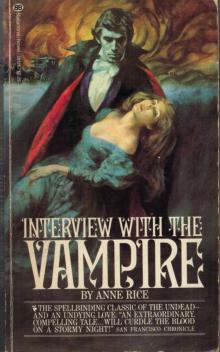 Interview with the Vampire
Interview with the Vampire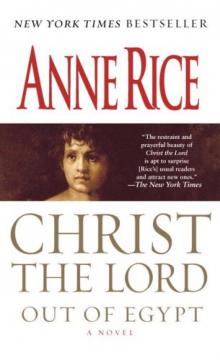 Christ the Lord: Out of Egypt
Christ the Lord: Out of Egypt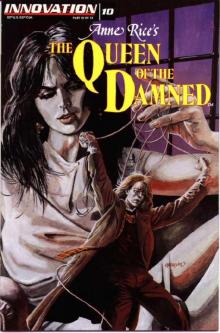 The Queen Of The Damned
The Queen Of The Damned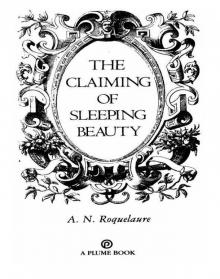 The Claiming of Sleeping Beauty
The Claiming of Sleeping Beauty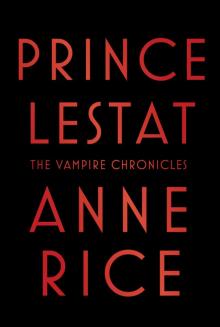 Prince Lestat
Prince Lestat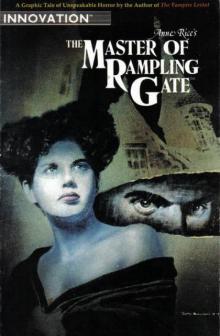 The Master of Rampling Gate
The Master of Rampling Gate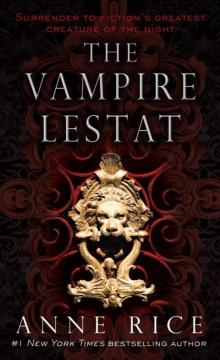 The Vampire Lestat
The Vampire Lestat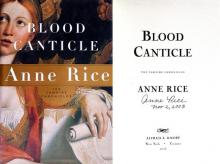 Blood Canticle
Blood Canticle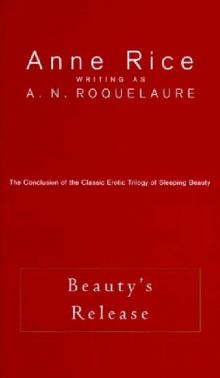 Beauty's Release
Beauty's Release Pandora
Pandora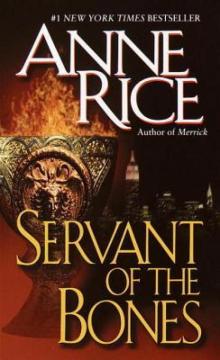 Servant of the Bones
Servant of the Bones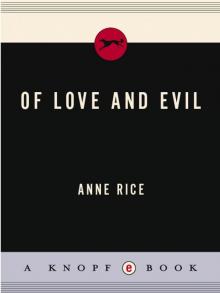 Of Love and Evil
Of Love and Evil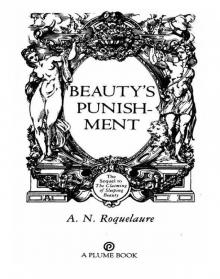 Beauty's Punishment
Beauty's Punishment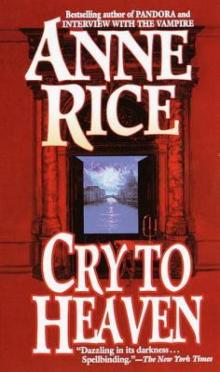 Cry to Heaven
Cry to Heaven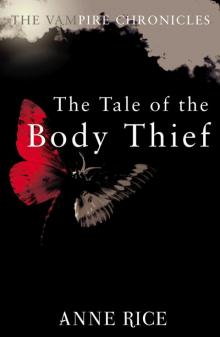 The Tale of the Body Thief
The Tale of the Body Thief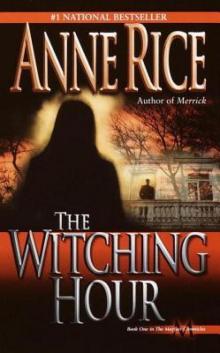 The Witching Hour
The Witching Hour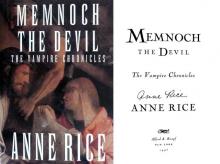 Memnoch the Devil
Memnoch the Devil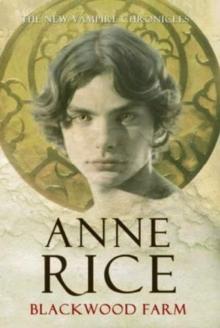 Blackwood Farm
Blackwood Farm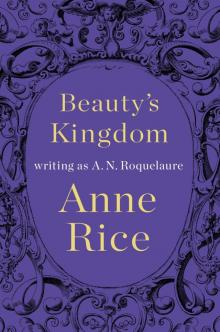 Beauty's Kingdom
Beauty's Kingdom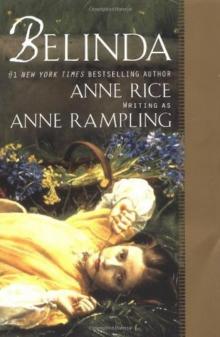 Belinda
Belinda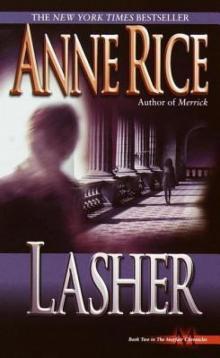 Lasher
Lasher Vittorio, the Vampire
Vittorio, the Vampire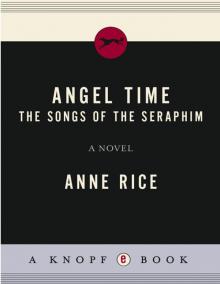 Angel Time
Angel Time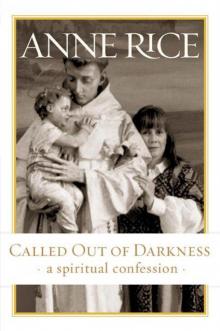 Called Out of Darkness: A Spiritual Confession
Called Out of Darkness: A Spiritual Confession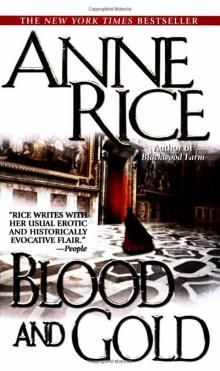 Blood And Gold
Blood And Gold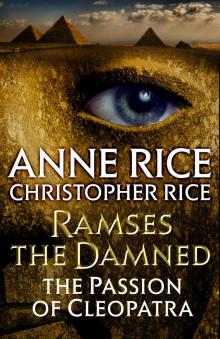 The Passion of Cleopatra
The Passion of Cleopatra Taltos
Taltos Exit to Eden
Exit to Eden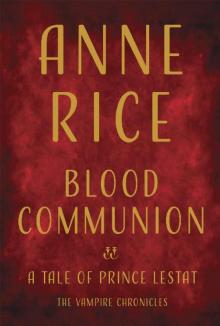 Blood Communion (The Vampire Chronicles #13)
Blood Communion (The Vampire Chronicles #13) The Wolf Gift
The Wolf Gift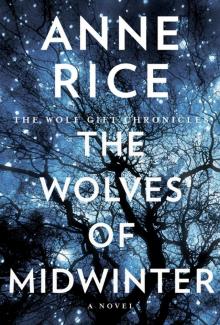 The Wolves of Midwinter
The Wolves of Midwinter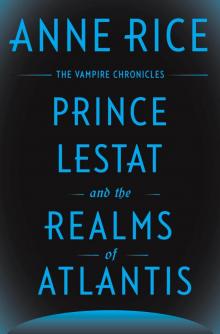 Prince Lestat and the Realms of Atlantis
Prince Lestat and the Realms of Atlantis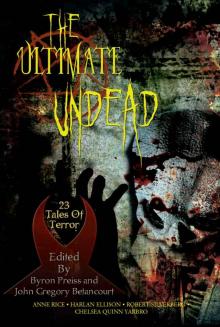 The Ultimate Undead
The Ultimate Undead The Vampire Lestat tvc-2
The Vampire Lestat tvc-2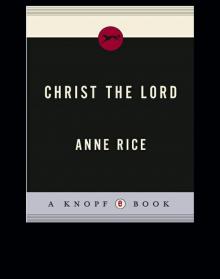 The Road to Cana
The Road to Cana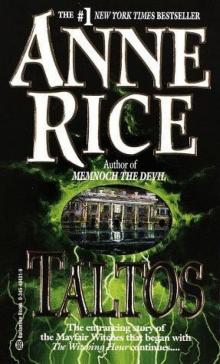 Taltos lotmw-3
Taltos lotmw-3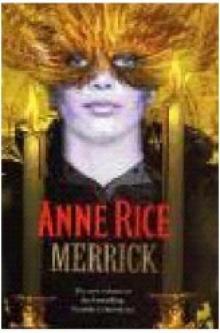 Merrick tvc-7
Merrick tvc-7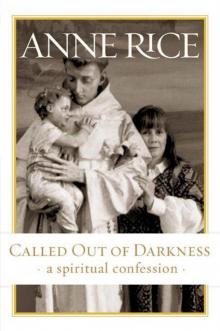 Called Out of Darkness
Called Out of Darkness Pandora - New Vampires 01
Pandora - New Vampires 01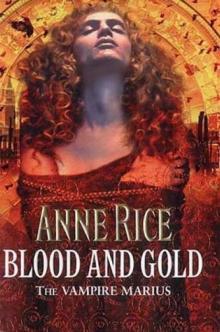 Bllod and Gold
Bllod and Gold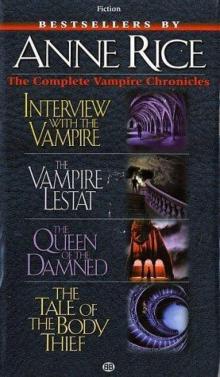 The Queen Of the Damned: Vampire Chronicles
The Queen Of the Damned: Vampire Chronicles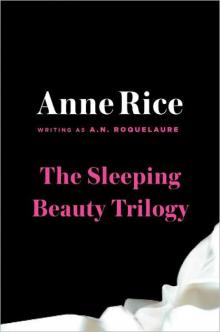 The Sleeping Beauty Trilogy
The Sleeping Beauty Trilogy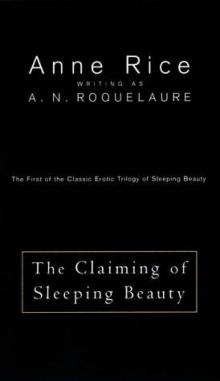 The Claiming of Sleeping Beauty b-1
The Claiming of Sleeping Beauty b-1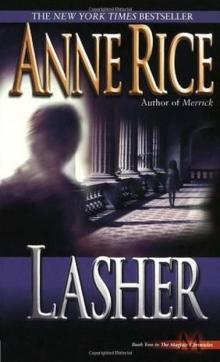 Lasher lotmw-2
Lasher lotmw-2 The Tale of the Body Thief tvc-4
The Tale of the Body Thief tvc-4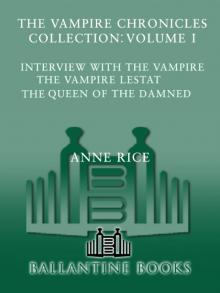 The Vampire Chronicles Collection
The Vampire Chronicles Collection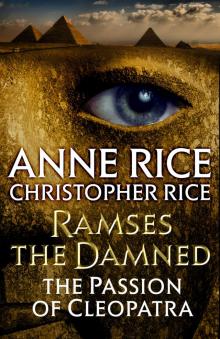 Ramses the Damned
Ramses the Damned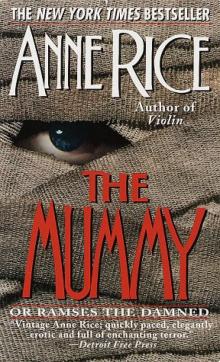 The Mummy - or Ramses the Damned
The Mummy - or Ramses the Damned Vittorio, The Vampire - New Vampires 02
Vittorio, The Vampire - New Vampires 02 The Vampire Armand tvc-6
The Vampire Armand tvc-6 Queen of the Damned tvc-3
Queen of the Damned tvc-3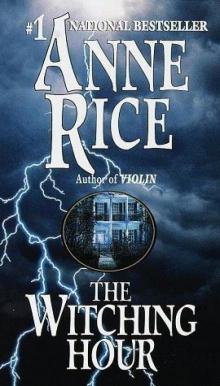 The witching hour lotmw-1
The witching hour lotmw-1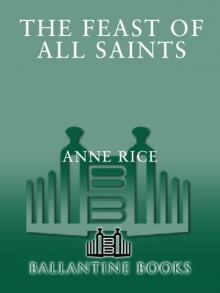 Feast of All Saints
Feast of All Saints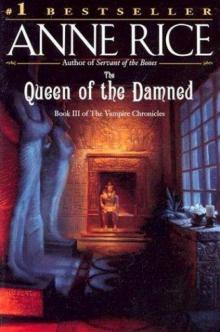 Queen of the Damned
Queen of the Damned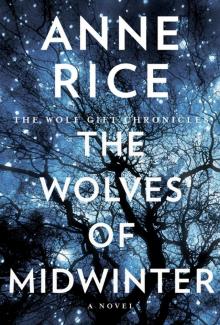 The Wolves of Midwinter twgc-2
The Wolves of Midwinter twgc-2 The Mummy
The Mummy Blood and Gold tvc-8
Blood and Gold tvc-8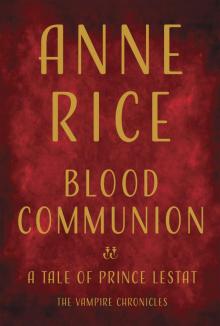 Blood Communion
Blood Communion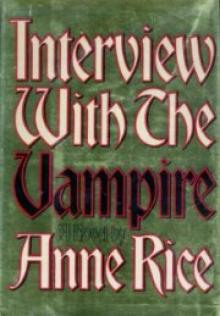 Interview with the Vampire tvc-1
Interview with the Vampire tvc-1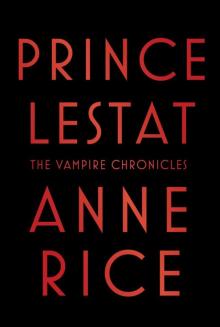 Prince Lestat: The Vampire Chronicles
Prince Lestat: The Vampire Chronicles